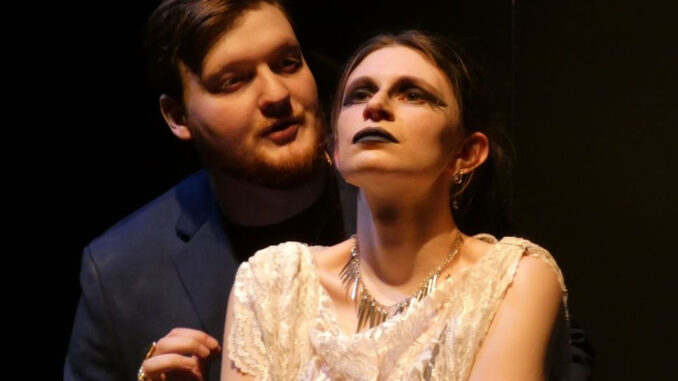
Emma Polen | Editor-in-Chief
Those unsure how to portray the complex, tortured character of Medea may look to Red Masquers’ Susan Betten, starring this week in the Greek tale of the priestess wife of the ancient hero Jason in Duquesne’s own Genesius Theater Feb. 8-18.
Medea, in Greek mythology, is the granddaughter of the sun god Helios, and the theatrical performance of “Medea” focuses on her powers of poison, premonitions and persuasion. She is a woman misunderstood by the world and vengeful of those who have outcast her.
The play opens as Betten appears into the spotlight wearing white, reminiscent of a wedding gown as she clings to the prior passion of her relationship with her husband Jason before his betrayal dooms her to a life of exile. The shawl, belted around her waist with a gothic black corset, overlays a shaggy black dress, laying in ripped layers at her knees. Betten’s costume portrays the difficult inner struggles of the character — having to appear collected on behalf of her family while inside she faces the dark weight of her husband’s adultery, the shunning of an entire kingdom and the hate of her own family, who she left to be with Jason.
Replacing the ancient circlets of gold around Greek women’s wrists and neck, this punk modern version wears spiked bracelets and a long silver clasp around her neck and earrings to match.
The supporting cast, made up of her waiting women, children, Jason and the couple’s respective servants, wear contemporary clothes that speak to the historical significance of “Medea” while playing with a modern feminist identity.
The muses, listed as the “Greek Chorus” in the Red Masquers’ play program, wear loose, beige outfits and act mainly as Medea’s background dancers and voices of reason. Their lack of extravagant accessories emphasizes Medea’s use of the eclectic.
The two narrators of the play, Medea’s nurse and Jason’s messenger, are clothed in blood red tops and brown trousers, foreshadowing the violence to follow.
Jason, played by Julian Cerminara, wears attire suitable for a successful businessman, in a red shirt under a blue suit coat. Around Jason’s neck is a gold chain, a reminder of the Golden Fleece Medea helped him steal that protects him from his enemies.
Medea’s presence looms over all of the other characters in the play, even in the beginning of Act 1 when the audience cannot see her but can hear her. While this limits the amount of interpretation Betten is able to add to her lines, there is no lack of emotion in her words. She is desperate and angry. But when she appears back on stage, her body language is restrained, as well as the emotional tone of her voice, portraying a barely-controlled rage under the surface of her cool facade.
Medea’s waiting women are supposed to be her support during these difficult times, but the way they lean away when Medea approaches makes it obvious they are scared of the priestess. However, they respect her. Medea’s supporting women also guide the audience’s view toward the husband, Jason. They’re not afraid of him, even when he raises his voice to Medea feet away from them. Medea’s presence emboldens them with a pride that nearly matches the male Greek hero’s ego.
While there is plenty to make Medea out as scary throughout the play, she is never the antagonist. She is exiled, her husband leaves her and she has to decide whether to leave her children behind. Jason is ungrateful for all of her help during his quests, saying to her, “I gave more than you.”
Medea plots and brainstorms the best ways to hurt her ex-lover. She approaches vengeance with a “no compromise” mindset and accepts what she needs to do, whether it hurts her too in the process.
The “Medea” cast maneuvers old English lines that are not inherently clear, similar to a Julius Caesar monologue, but the important plot points get through to the audience, mainly through emotional tone of voice, sometimes reaching the audience’s ears at a screaming volume.
This higher level of volume makes it difficult to make out the cast’s lines sometimes, especially post-scream when music or lowered voices offer a challenge for audience ears to interpret. The dance numbers, using slow, modern tunes in the genre of alternative rock grunge, use both melody and movement to tell an interluding story between dialogue.
The play ends in a final confrontation between Medea and Jason. Taken from the original Euripides version of the story, this moment is supposed to provide a final understanding of how likable these mythological figures should remain in the eye of the viewer. Thankfully, Betten’s powerful use of minute facial expressions and costume design gives the audience a clue to these big questions by the closing curtain.
Once the show is over, and you’re left feeling more than a little depressed, I would suggest heading back to your room and watching a Disney movie to cleanse the palette.
EDITOR’S NOTES: Emma Polen and Susan Betten have worked on previous production together.
